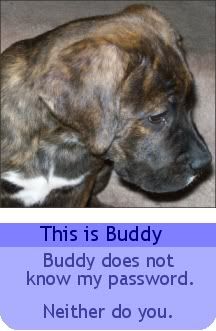You know I freelance, but I thought it was time I actually said what it is I do. It's a little complicated. I never fully switched from web developing to writing, and I tend to oscillate between the two. I'll be honest, for those of you looking to start an online career. I spend part of every day looking for new work, but most of my work comes to me unsolicited, through recommendations from people I've worked for. Which is why it's so hard to get started from scratch. I've got contacts that go back years. I'm just sorry I didn't have a blog going the entire time, and I'm also sorry I never put much stock in social connection sites. I was dumb enough to think I'd retire with my job still intact . I won't actually retire until I cannot physically work anymore, because not working makes me so antsy I can't sleep. literally. I went a little crazy last week at Mom's. She's on dialup and between the slow connection and the desire to spend as much time as possible with my family, work was impractical. But I didn't sleep much. Too many ideas pounding the inside of my skull, I guess.
Anyway, as I've stated before, I primarily write for Phemomenal Content, and what I turn in for them is distributed to various projects and remains uncredited. That's usually true of a content service. When I have a few minutes to spare, I also seed articles at unpaid article databases like ehow.com (note: they claim to pay a revenue share, and I'll let you know if that adds up to anything) and ezinearticles.com, and the purpose of these articles are simply to publicize both myself and Phenomenal Content. Not that I really have much time to do so.
I also write for Brighthub. Can't say it pays all that well, so in order to compensate, I write faster, shorter articles with less detail. There's something wrong with that concept, but many content and article services use it. They wish to sell articles, but putting out a truly saleable article takes me much longer to craft than the pay allows. So I just crank out something readable and accurate without much thought to saleability. I suspect this business model will fail, but I hope not, because it's a steady source of income.
Recently, I've been guest blogging at uptake.com. I've done half a dozen or so hotel-related blog posts, and I hope that they will hire me as a full time blogger, but there's no point in applying until my personal blog is earning some traffic.
Lastly (at the moment), I blog for GrowingBolder.com. My blog there is personal and opinionated. Because it's a site aimed at people finding a new lease on life as they grow older, I write about life in general. Memories, history, politics, work, family, media, you name it.
I also put up web sites, both independently and for the company that used to be my full time job, do graphics work, and contract out for flash, notably a viral marketing video that came out pretty well, for a web site that never got off the ground. My most current projects are developing a web site to answer the needs of affiliate marketers through the company, and doing a series of static web sites to sell to builders...a builder approached me about this product after recommendation from a friend whom I built a web site for a few months ago. Basically, I'm going to build a template and he's going to sell it, and we'll work together to put up the sites. Could be very lucrative. Could go nowhere. We'll see.
No matter how many projects I have on my plate, I spend a part of my day trolling for new work. I just put in an application for about.com to be their web hosting and development guide. I'd love to work for about.com, because the visibility and traffic is tremendous. I applied previously to be the humor guide, but they turned me down. I'm guessing a million people applied for that one. Personable geeks are more rare, though, so maybe I'll have a better shot at web hosting and development. One of my friends called about.com the holy grail of blogging :D It's a good description. Steady pay, high visibility, natural attraction for search engines, and it's credited. Pays very well, too. If they hire me, I'll cut down on some of the random stuff, because they pay is potentially high enough to command my very best work and the promotion that goes with it. Keep your fingers crossed.
I get a few random gigs here and there off sources like craigslist and freelance boards, but there are so many people out there looking for slave labor that it's discouraging. To people who want to pay $4.00 for a 500 word article, I say: you get what you pay for, and you deserve it. Surf the web sometime. Read some articles. Some of them are barely coherent. The ideas are confused, the information is sketchy at best, and the grammar and spelling is atrocious. That's what you get when you pay peanuts (and sometimes when you try to do it yourself).
So that's what I do, best described as a little of this, a little of that. Generally speaking, I work 7 days a week, but I work at my own pace. Some days I'm hugely productive and turn out article after article, other days my imagination flags and I spend more time looking for new work or building my social network. I really don't spend enough time doing that, but I should. I should also push my blog harder, but I don't. At least not yet. I want to build it up a bit first. All I really want is to be interesting.
Tuesday, July 28, 2009
Sunday, July 19, 2009
What Users Can Learn From the Attack on Twitter

After reading this article, The Anatomy Of The Twitter Attack today, it occurred to me that the measures I use to protect my passwords might prove helpful to others. In a nutshell, the article outlines how the security of the Twitter server was attacked by a hacker who first compromised a single employee. Set aside for a moment the potential implications for the security breech of a big company, and consider what this might mean to you personally.
The first step of this attack was to gather personal information about Twitter employees. Using nothing more sophisticated than web search, any determined hacker can track down a ton of information on any person who posts on the web. We tend to put a lot of information out there in casual conversation. I often talk about where I live, where I work, my kids, where my husband works, Mom's home town (she's from Roatan, Honduras). I've mentioned where my daughter works, and on thursday had a discussion about my dog that included pictures, name and breed. Everybody knows how old I am, and on my birthday, I twittered "it's my birthday". So if anyone is collecting information about me, my dog's name or my birthday would be piss-poor passwords, now wouldn't they?
That's why using personal information as a password is a bad idea, and that's my first level of security. For most of the websites, I'm not really worried about security. Let's face it, what would really happen if someone compromised my Twitter account or my Photobucket? The inherent danger there is for people who use the same passwords on every account. Trust me, you might guess my password for photobucket, but you'll need FBI equipment to figure out the passoword to my bank account. And if the FBI is looking into my bank account, I've got bigger problems than a security breach.
Another level of security is in how I store my passwords. My memory is sketchy at best. Mom calls it CRS (can't remember shit) syndrome. I have to write them down. Most people keep a file on their desktop called "Passwords". I keep a file in a folder calld "Recipes" called "Holiday Fruitcake"...because nobody is ever going to open that.
Inside the fruitcake file, I use two levels of security. For accounts that need low-level security (just to stop people from insulting my friends, no financial information online), I use a simple word/number combination and vary the case. I use the same hard-to-guess word but a different number.
In the file, it looks like this:
heLiotroPe
Twitter123gmail
Yahoo456yahoo
Facebook789gmail
This documents the web site, the password (for Twitter, it would be heLiotroPe123) and the username (my gmail email address). Needless to say, these are not my actual passwords, it's just the system I use. Note the odd placement of uppercase letters. That, too, makes your password harder to guess.
For banking information or any account where I use my credit card, I use a completely different method. I make up a random string of numbers and letters (plus special characters if allowed) and encrypt them within a longer string. It looks like this:
ss872WCHz7&45ku7djT1v8967Gls5xP
Given that string, how long would it take you to figure out that it's the login info for a Wachovia bank account, and the password is ku7djT1v89? Here's the anatomy:
ss872WCHz7&45ku7djT1v8967Gls5xP
username - ss refers to my usual username, sherisaid
website - the minimum combination of letters it will take me to recognize what it is, in this example, Wachovia.
parameters - the password itself goes between a recognizable string, usually numerical, like 45 and 67. It might also be symbols !@ and #$ or a word, like cO and rE.
When I travel, this information is stored in a password protected file on a flash drive. A password protected flash drive would be better, but I haven't invested in one yet. I use one of my impossible passwords and write it down on a card that I keep in the glove box of my car, because I might lose the flash drive, but the chances of losing both my car AND my flash drive are pretty darn high.
Another thing I would never do is store my passwords for easy login. Unless, again, it is very low risk. One high risk account that very few people think about is email, because once someone has access to your email, they can send password requests to all your accounts. Think about it...you get updates and mail from the websites you belong to, and they are often stored online. That tells a hacker where to look, and if he's in your email, chances are he already has your password to everything. My solution to this issue is to register financial accounts with an account I use only for that purpose. I don't send mail from this account, and I download the mail I received and remove a copy from the server. That narrows possible email spies to the people inside my house, unless someone actually steals my computer.
Here's a list of the 500 most common passwords. None of mine are on this list. I'll bet half the people who will read this are using a password in the top ten. If so, you're hacker-meat.
Saturday, July 18, 2009
Freelance work is terrifying! Why I do it anyway.

In life, stuff happens, and about a year ago some big stuff happened in mine. I'd been happily working as a web developer for a small company for about 8 years, and without warning, the business ran out of money. I'm sure it wasn't "just like that", however, finances weren't my department and I wasn't forewarned.
Functionally jobless in a rapidly tanking economy with unemployment rising at lightning speed, I knew it wasn't going to take long for us to get in financial trouble. It was time to reinvent myself.
My choices were to look for a traditional job, a proposal that had a number of issues, not the least of which was wardrobe - since I have been working from home for years, if I can't sleep in it, I don't own it - or finding a way to make money online. There are a lot of scammy, bogus offers out there and the competition is fierce for legit online jobs. One blogging job offered on craiglist asked for my credit card and social security number so they could "do a background check". What? I also found out pretty quickly that there are people in other countries who will work for 13 cents an hour, and some of them claim to have more skills than I have. I maintain that you get what you pay for, and the number of amateurish websites loaded with horrific grammar and poor word usage pretty much bears that out.
Two inches from desperation, I got a suggestion from a friend whom I've known and loved for about ten years, Christina Gleason. Christina was the head editor for an SEO content business and needed a writer. The pay was only so-so, but there was a LOT of work. Writing has been my passion since childhood, I just didn't have any idea that I could get paid to write outside traditional avenues. My 25 year old college education and work history largely unrelated to writing did not exactly lead me to believe that becoming a writer was in the cards.
Today, most of my income is from writing. Christina started her own business, PhenomenalContent.com and I freelance for her and write articles and such to help build her business. Recently, the Phenomenal staff had a little fun blogging sex week. Traffic really picked up ;) A lot of other freelance work comes my way as well, this guest blogging post about finding a romantic vacation hotel, for example.
I've recently been looking into affiliate marketing, which I blogged about at GrowingBolder.com. I'm still learning about making money online, and wrote about what I've learned so far. I love the site, and some good friends run it. I think it was their influence and attitude that inspired me to take my fate in my own hands and jump off the freelance cliff.
So that's how I got to this point, and the next step is a personal blog (this one) designed to build my personal brand. I plan to write about whatever interests me...making a living online, politics, diabetes concerns, healthy living, humor, why TV pisses me off on a regular basis, and anything else that might occur to me. I might even indulge in a little creative fiction...I've been known to do that from time to time.
Photo credit:
Sherry Gray is a professional writer. Contact me directly for projects or check out PhenomenalContent.com for large-scale content creation.
Subscribe to:
Posts (Atom)
